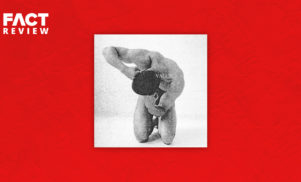Visionist evolves with each of his releases and his latest, Value is no different – perhaps to its detriment. Tayyab Amin looks at the album’s ideas on opposing forces and finds that the holistic, amorphous concept is interesting, but the execution is lacking.
Visionist (né Louis Carnell) originally carved a place for himself as one of the more idiosyncratic voices to emerge from a spate of grime-inspired producers that popped up in the early 2010s. He has flitted between producing dancefloor stormers and meditative movements and put together impassioned, pitched-choral productions that explored R&B and Chicago house. Safe, a 2015 PAN release, found the UK native ditching the kicks and snares of his expansive, club-minded approach for more abstract arrangements. Mangled vocal melodies exploring anxiety and the more personal, emotional aspects of his craft came to the fore. Themes of the personal and vulnerability permeate his new album, Value (Big Dada), too.
Presented as a similar rumination on self-worth and the perceptions of an artist confined to genre, the album comes with a wider sonic palette of textures and influences. It crams in his signature celestial vocal samples and boundless synth ascensions, spoken word over weightless styles, distorted rhythms, industrial percussion and digital ephemera. Carnell described the album’s themes as “machismo and effeminacy, self-deprecation and self-love,” as well as “self-preservation and validation” and those opposing ideas are viscerally present throughout the album. But the clashing aesthetics used to explore these themes make the album a frustrating listen.
Value is an album of binaries. This is clearly demonstrated in its lead single, ‘No Idols’: wandering, Tim Hecker-esque piano is juxtaposed against disintegrating drills before both parts are engulfed by a dizzying, delayed arpeggio synth outro. The components of the track feel oddly immutable, comparable to a yin and yang that merely encircle each other and never truly mix or form a whole. The compartmentalization of notions of soft and hard, passive and aggressive imbues the record with disjointed qualities. It works as an intentional refraction of Carnell’s own inner conflicts, but is, ultimately, an unrelatable reflection of the self. On ‘Homme’ and ‘Made in Hope’, waning piano movements are swept in and out of flickering synths and poignant atmospherics with apparent intent to walk along the fence. The tracks eventually land on either side of it, rendering the tension obsolete as both sides are pacified.
Much of Carnell’s work is renowned for its focus on melody, from the eyes-down sighs of ‘M/Secrets’ to the eerie and precarious progressions on Safe. Prominent as ever, the melodies on Value encapsulate both the highs and the lows of the album. On ‘New Obsession’, industrial stomps are interweaved with heavenly harmonies to reach the sort of raw utopia you’d find in The Matrix. It then explodes into a thunderous loop of piercing cries and rattling metals in what stands out as a climax on the album, deftly meshing pain with care. It is a rare moment of artistic triumph for the album, one that highlights the fact that Value is otherwise fairly messy. When the internal tensions are stripped of what makes Carnell’s work usually so enticing, the melodies do not manifest with grace. This is especially apparent on interlude ‘Exi(s)t’, which brings to mind an advertisement for ringtones.
There’s plenty of introspection and self-reflection at play in Value, though resolution and growth aren’t so tangible. It’s an album of alternating calms and storms, only occasionally reaching the eye at the center of it all. This results in a back-and-forth narrative that doesn’t come across as holistic, amorphous and interrelated as its themes and inspirations are. While there are moments that strike gold, it’s hard to not think of the blunted pickaxes and underexplored possibilities that pave the way. The dichotomies it works with, such as machismo and effeminacy, can seem forced and there’s a feeling that their relationships are more complex than as represented on the record.
Value finds Carnell wandering within himself, stringing moments together only to leave us hanging at the end. It’d no doubt be exciting to hear the producer further engage with these themes in contexts less constrictive than the album format. “Aesthetic can be achieved by everyone, but approach separates the individual,” he says of the album, embodying the mantra through its artwork, zine and presentation as well as his work in fashion and the arts. Value provides few answers to the big questions it poses, but for Carnell, his journey feels like it could still just be the start.





























